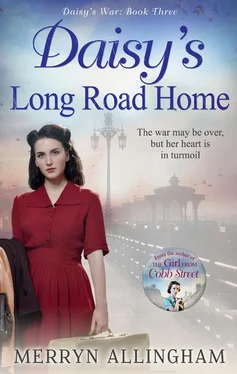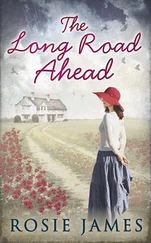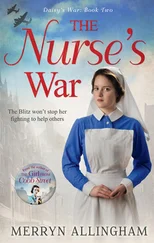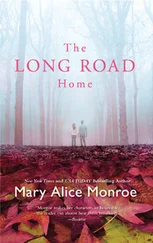MERRYN ALLINGHAMwas born into an army family and spent her childhood on the move. Unsurprisingly, it gave her itchy feet and in her twenties she escaped from an unloved secretarial career to work as cabin crew and see the world. The arrival of marriage, children and cats meant a more settled life in the south of England, where she’s lived ever since. It also gave her the opportunity to go back to ‘school’ and eventually teach at university.
Merryn has always loved books that bring the past to life, so when she began writing herself the novels had to be historical. Writing as Isabelle Goddard, she published six Regency romances. Since then, Merryn has set her books in the early twentieth century, a fascinating era that she loves researching. Daisy’s War takes place in India and wartime London during the 1930s and 1940s, and is a trilogy full of intrigue and romance.
If you would like to keep in touch with Merryn, sign up for her newsletter at www.merrynallingham.com.


To my father, who spent the happiest years of his life in India, but who never went back
After a while, whoever you are, you just have to let go,
and the river brings you home
—Joanne Harris, Five Quarters of the Orange
Cover
About the Author MERRYN ALLINGHAM was born into an army family and spent her childhood on the move. Unsurprisingly, it gave her itchy feet and in her twenties she escaped from an unloved secretarial career to work as cabin crew and see the world. The arrival of marriage, children and cats meant a more settled life in the south of England, where she’s lived ever since. It also gave her the opportunity to go back to ‘school’ and eventually teach at university. Merryn has always loved books that bring the past to life, so when she began writing herself the novels had to be historical. Writing as Isabelle Goddard, she published six Regency romances. Since then, Merryn has set her books in the early twentieth century, a fascinating era that she loves researching. Daisy’s War takes place in India and wartime London during the 1930s and 1940s, and is a trilogy full of intrigue and romance. If you would like to keep in touch with Merryn, sign up for her newsletter at www.merrynallingham.com .
Title Page
Dedication To my father, who spent the happiest years of his life in India, but who never went back
Epigraph After a while, whoever you are, you just have to let go, and the river brings you home —Joanne Harris, Five Quarters of the Orange
CHAPTER 1
CHAPTER 2
CHAPTER 3
CHAPTER 4
CHAPTER 5
CHAPTER 6
CHAPTER 7
CHAPTER 8
CHAPTER 9
CHAPTER 10
CHAPTER 11
CHAPTER 12
CHAPTER 13
CHAPTER 14
CHAPTER 15
CHAPTER 16
CHAPTER 17
CHAPTER 18
CHAPTER 19
CHAPTER 20
CHAPTER 21
CHAPTER 22
CHAPTER 23
CHAPTER 24
Endpages
Copyright
Sussex, March 1948
Daisy ignored the doorbell when it rang. It had been a bad day and she’d no wish to entertain her prying neighbour. Half her nurses were down with influenza, but the ward was so crowded she’d had to order the few still on their feet to make up beds in the corridor. The row with Matron had been the last straw.
The bell rang again and she shut her ears to it. Until the third chime. Then she marched to the front door and flung it wide in exasperation. A man leant nonchalantly against the doorpost and she stared in amazement at him.
‘Grayson?’
‘It’s nice to see you recognise me.’ She didn’t think he meant it as a jest. And why would he? It was months since they’d seen each other.
She tried to pull her thoughts together. ‘But why are you here?’
‘I needed to see you. Can I come in?’
‘Yes, of course.’ There had been a momentary hesitation and he was quick to notice it. ‘Don’t worry, I’m not staying. I have a train to catch back to London.’
But why had he needed to visit, and without warning? There had been no letter, no telegram. That was worrying and she wondered what was coming. She hadn’t been wrong about the edge to his voice though. He was the man she’d loved, perhaps still loved, yet after so long apart, neither had made any attempt even to touch hands. He followed her into the small kitchen that gave straight on to the road and looked around him. She’d been here for nine months and this was the first time he’d walked through her door.
‘It’s cosy,’ he decided.
‘It’s affordable.’
‘Is Brighton so very expensive?’
He settled himself at the shabby wooden table. As always, he was completely relaxed. Only the slightly deeper creases around his mouth and the few grey hairs at his temple spoke the passing of years.
‘Not by London standards, no, but salaries here are low.’
‘And how is the job?’
She didn’t answer immediately but put the kettle on to boil. She knew the job was a source of irritation to him, and she couldn’t even boast that it was going well. Today had been the worst by far, culminating in a vitriolic exchange with her superior. For the first time, she’d answered the woman back and known immediately she’d done the wrong thing.
‘Beecham’s is a small hospital,’ she said, arranging cups and saucers on a tray. She was prevaricating, but if she showed her true feelings, she’d have to acknowledge the mistake she had made in coming to Brighton.
‘So?’
‘It can be a little insular, that’s all. Trifles can become too important. And the work itself is hardly challenging.’ She was willing to confess that much, but she wished she didn’t sound quite so weary or quite so frustrated.
‘I imagine the lack of challenge is inevitable. After the war, most nursing will seem humdrum.’
She poured the tea, trying to lose herself in the routine action, conscious she should fight a desire to confide in him. They were almost strangers now. Since she’d made the move to Brighton, they’d met only once. She’d gone up to London to spend the day with him just before Christmas. It had been a forlorn attempt to rekindle a love that had once burnt brightly. In determined fashion, they’d made their way around old haunts, exchanged opinions on the city’s new landmarks, chattered a little too much, told a few too many silly jokes, but there had been a hollowness to the day that neither could ignore. They hadn’t repeated the experiment. And now he was here, and she didn’t know how she should feel.
‘You could be right about the war,’ she said, carrying the tray to the table, her finger jabbing at a small spill of tea on the plastic tablecloth. ‘It was an extraordinary experience.’
She sat down opposite him and felt his eyes fixed on her. His gaze made her shift uneasily in her seat. He knew she wasn’t happy, she thought. As always, he knew, and she could feel herself getting ready to confess the truth.
‘Brighton might have been a mistake,’ she blurted out.
There, she’d said it, but his eyebrows barely rose at the admission. ‘I got the promotion I wanted, but the nursing is fairly basic, and though the patients are wonderful and most of my staff are well enough …’ The words were tumbling forth now. ‘It’s the pettiness that gets me down. It’s a small town and the hospital is a very small community.’
Читать дальше














